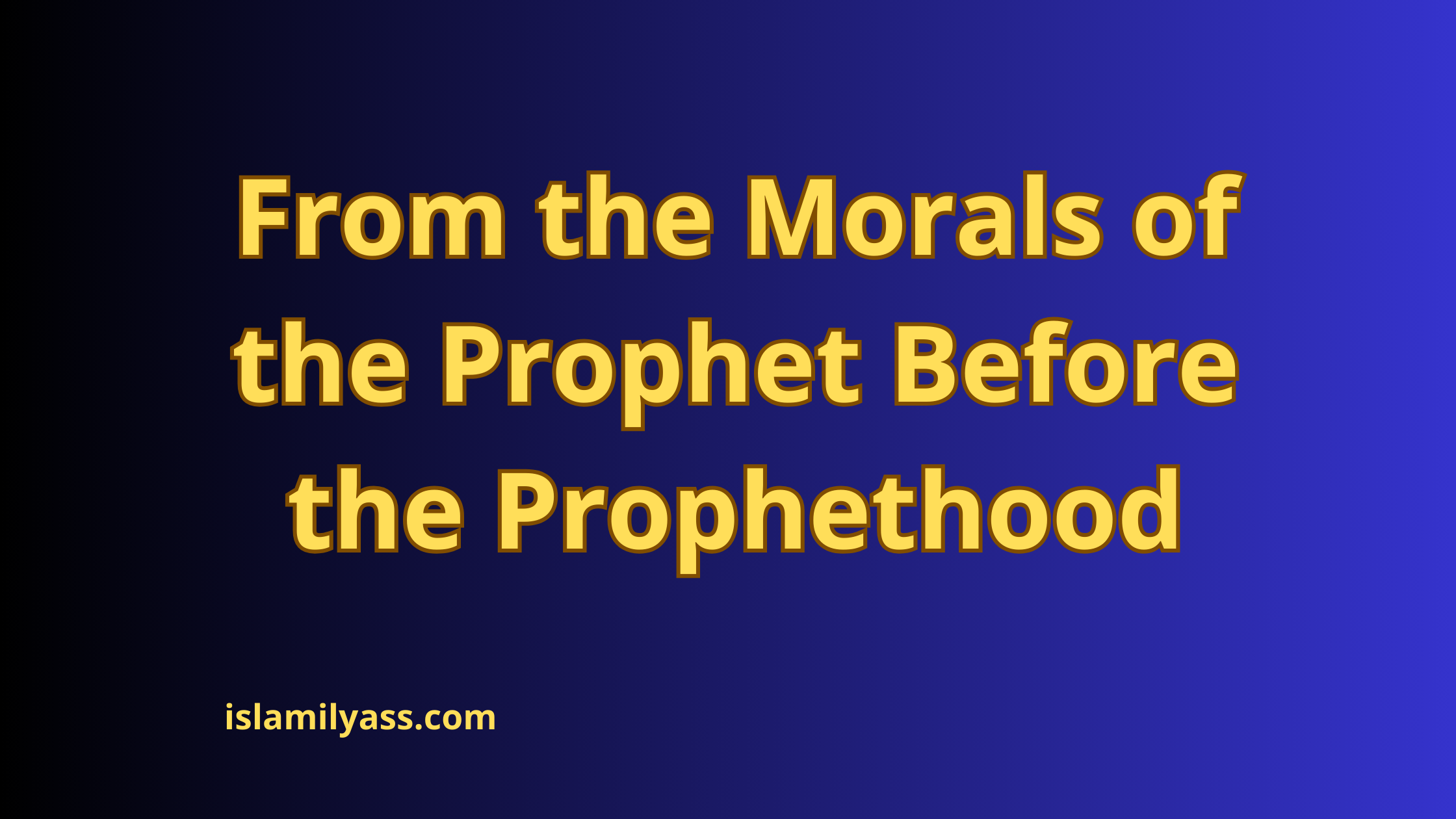From the Morals of the Prophet Before the Prophethood
The Prophet Muhammad (peace and blessings be upon him) was born in Mecca and lived there for most of his life until he migrated to Yathrib (Medina). His life in Mecca, before the prophetic mission, was different from that of many young men in the Arab tribes for whom Mecca was home. By the will of Allah, Muhammad (peace and blessings be upon him) was protected as a child and a young man, until the announcement of his prophethood came when the revelation descended upon him in the Cave of Hira, near Mecca. After a long period of contemplation and reflection, secluded from people, he would worship in the cave for days, focusing on drawing closer to Allah, with remnants of the religion of Prophet Ibrahim (peace be upon him). His early life before marriage was not isolated from reality, nor was it entirely focused on the afterlife. It was a life of unique qualities that did not divert him from the concerns of his environment or prevent him from engaging with the significant events that were the subject of reflection and agreement or disagreement in a society ruled by the authority of the tribe and other considerations, such as the worship of numerous idols and the presence of enslaved individuals, mostly black-skinned, which, at the time, was a source of disdain.
Among the participations in word or deed, which did not fade from the memory of Muhammad (peace and blessings be upon him) as events unfolded until he was sent as a prophet to all creation, the following stand out:
1- The Prophet’s Behavior in the Fight of Fijar:
The Fight of Fijar was one of the tribal wars between the tribes of Kinanah and Qays ‘Aylan. The Quraysh tribe taken an interest, adjusting themselves with Kinanah. The Quraysh tribe participated, aligning themselves with Kinanah. The war resulted in a victory for Kinanah over Qays, and the Prophet Muhammad (peace and blessings be upon him) was between 15 and 20 years old at the time.
Biographers of the Prophet have mentioned that there were four Fijar wars among the Arabs, including the most significant one, known as “the Day of Shurb” (the Day of Drinking). The Prophet attended this battle and assisted his uncles on the side of Kinanah. The fighting lasted many days, and the outcomes were often indecisive, leading to prolonged accounts of the events and exaggerated claims of glory.
However, the Prophet’s participation in this battle did not leave any negative impact on him, nor did it affect his pristine character, which remained pure until the angel Jibril (Gabriel, peace be upon him) descended with the divine revelation.
2- Praising the Treaty of al-Fudul:
The Treaty of al-Fudul was formed several months after the Battle of Fijar and occurred twenty years before the prophetic mission. In this treaty, certain tribes pledged to stand together in defense of the oppressed against the oppressor. The Prophet Muhammad (peace and blessings be upon him) witnessed this event, where the clans of Banu Hashim, Banu Zuhra, and Banu Taym gathered in the house of Abdullah ibn Jud’an in Mecca, vowing to protect the weak and the wronged. Various reasons were cited for its formation, though the goal was unified and noble. It is said the treaty was named “al-Fudul” because three of the noblemen who called for it were named Fadl.
This treaty elevated the status of the Quraysh among the Arab tribes,
Though the Prophet (peace and blessings be upon him) did not have a direct role in forming or influencing the treaty due to his young age, he later commended it for promoting social justice, preventing bloodshed, and fostering unity among rival factions.
3- Resolving the Dispute During the Reconstruction of the Kaaba and the Placement of the Black Stone:
Historical accounts narrate that the Kaaba suffered damage due to a fire, which started when a woman perfumed it, causing a spark to ignite the covering and wooden parts. A flood then further weakened its structure, prompting the Makkans to decide to demolish and rebuild it. However, they disagreed about the process until another flood made the reconstruction unavoidable. The Makkans began rebuilding, leaving the original green stones as the foundation of the Kaaba. This took place five years before the prophetic mission. The Prophet Muhammad (peace and blessings be upon him) participated by helping to carry stones to complete the structure.
When the construction reached the point of placing the Black Stone, a dispute arose about who would have the honor of placing it in its proper position. The tribes then agreed, as narrated by Ibn Hisham in his biography of the Prophet, to let the first person to enter the mosque make the decision. The first to enter was none other than Muhammad (peace and blessings be upon him). Upon seeing him, they said: “This is the trustworthy one, we are pleased, this is Muhammad.” When he reached them and was informed of the situation, he asked for a cloth, placed the Black Stone in the center of it with his own hands, and then asked each tribe to take hold of a corner of the cloth and lift it together. When they reached the correct height, the Prophet (peace and blessings be upon him) placed the stone in its designated spot, and the building was completed above it.
This wise solution to the dispute further established the Prophet’s (peace and blessings be upon him) reputation as a trusted mediator, worthy of consultation in future crises, and confirmed his title as “Al-Amin” (The Trustworthy).
4- The Attribute of Trustworthiness:
The Prophet Muhammad (peace and blessings be upon him) was known for his exceptional trustworthiness, particularly after he worked in trade, accompanying his uncle Abu Talib on a journey to Syria. Later, he handled the wealth of Lady Khadijah bint Khuwaylid, following her offer for him to take her merchandise to Syria in return for higher compensation than she usually gave to others. The Prophet accepted and performed the task with utmost sincerity and honesty, which was attested to by his companion Maysarah, Khadijah’s servant, who confirmed the Prophet’s trustworthy character.
This reputation for trustworthiness helped the Prophet in many ways, including in his marriage to Khadijah, who bore him children, and in establishing his standing among the Quraysh, who trusted him with their possessions. This trait remained with him even during the Hijra (migration), when he left Ali (may Allah be pleased with him) behind to return the entrusted belongings to their rightful owners after the Prophet’s departure from Mecca.
5- Sincerity in Work:
The Prophet Muhammad (peace and blessings be upon him) began working from a young age, tending sheep in the desert of Banu Sa’d, where his nurse Halimah al-Sa’diyyah lived. He continued herding sheep when he returned to Mecca, later moving on to trade. He once said, as narrated by Abu Hurairah (may Allah be pleased with him): “Allah did not send a prophet who did not shepherd sheep.” His companions asked, “And did you?” He said: “Yes, I used to shepherd them for a few Qirats for the people of Mecca.” (Hadith)
From this experience, the Prophet acquired valuable traits, such as finding safe pastures, vigilance in protecting the flock, and patience—qualities that would benefit him in his future endeavors.
6- Depth of Contemplation:
The Prophet’s marriage to Lady Khadijah was a blessed union in which his honesty, loyalty, and integrity harmonized with her wisdom and character. This gave him the freedom to devote himself to contemplation, especially regarding the idolatry of his people, a practice that he could never understand or accept. He never bowed to an idol, and his heart remained unsatisfied until the truth was revealed to him. It was common for some Arab thinkers of the time to retreat for periods of solitary worship and reflection, a practice known as “Tahannuth” or “Tahannuf.” The Prophet, too, took to retreating to the Cave of Hira, where he would spend days in worship and reflection.
Thus, the life of the Prophet Muhammad (peace and blessings be upon him) before the revelation was an exemplary model of virtuous Arab life in Mecca. He witnessed tribal conflicts like the Battle of Fijar, the making of peace through treaties, such as al-Fudul, helped resolve disputes during the rebuilding of the Kaaba, and earned a reputation for honesty and trustworthiness. His moral excellence, coupled with deep contemplation, paved the way for the momentous event when the Qur’an was revealed to him.

